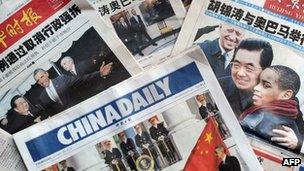Chinese media: Two stories, two treatments
- Published

China's media scene is increasingly vibrant - but some subjects remain off-limits
In the past week two cases in China have received very different treatment from the media.
Journalists have gone into overdrive covering a rape case in the southern city of Shenzhen.
But they have ignored the killing by security forces on Wednesday of armed soldiers who fled an army barracks.
The move shows that while media outlets funded by advertising have to fight for sales, they still have to operate under tight government controls.
'Media intrusion'
The rape case has provoked a storm. The 28-year-old victim is said to have been attacked by a neighbourhood security officer employed by the local government while her husband, a shop-keeper, hid in a nearby storeroom.
He eventually called the police one hour after the attack and took his wife to the hospital.
Police have arrested the alleged attacker and are now investigating the case.
Journalists are free to report this story without restrictions and the couple have drawn their focus.
The husband was surrounded by reporters and grilled - in a way seen by many as humiliating - on his failure to come to the aid of his wife.
On local television, the weeping man was seen describing himself as "the most useless husband and man in China".
His wife was also put under the media spotlight. Pictures appeared on the internet showing her in bed, a scarf over her face, surrounded by a sea of cameras and microphones.
This treatment has provoked strong reactions from some journalists and academics.
Chai Jing, a prominent presenter from the official China Central Television Station, launched a scathing attack in her blog on what she called media intrusion into the couple's privacy.
She criticised reporters for entering the couple's home without their permission and pointing cameras and microphones at the victims without their consent.
But the story is now also being widely discussed on the internet, with people variously blaming the husband, the government and society in general.
'Off-limits'
While this has been going on, another story has largely been ignored.
Three Chinese soldiers who fled their barracks armed with rifles and hundreds of bullets are reported to have been killed.
A fourth soldier who also fled from the base in Jilin city in northern China was said to have been captured by police.
The deaths were confirmed by officials on a microblog website and the escape was reported by the Communist Party mouthpiece, the People's Daily.
But later reports on both websites were apparently removed.
Chinese media outlets often receive direct orders from the authorities on what stories they can or cannot report.
Observers say in the wake of the recent Arab Spring uprisings, the Chinese government is focusing on maintaining social stability.
Strict and effective control of the mass media as well as the internet is seen as crucial in achieving that goal.
"The story about the renegade soldiers is too sensitive as it concerns the stability of the army, which is praised by the party as the iron and steel Great Wall of China," said Dean Peng, an independent media commentator in Beijing.
"Any stories that would lead the audience to suspect that the Communist Party and the government is in trouble would certainly be off-limits to Chinese journalists. But some crime stories, such as the rape case in Shenzhen, pose no such threat."
- Published3 November 2011
- Published17 February 2011
- Published4 January 2011